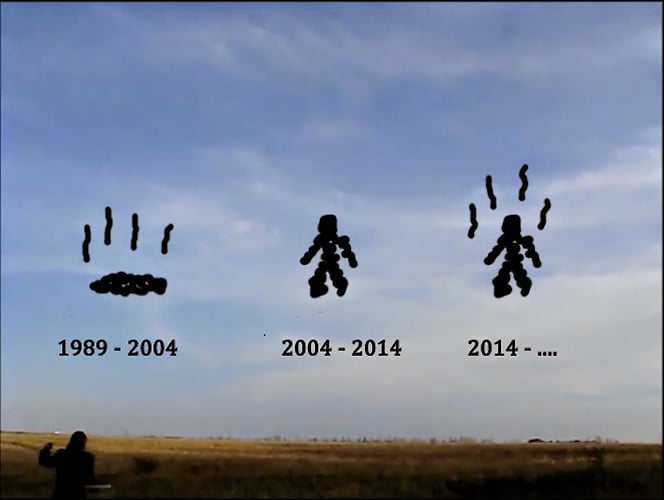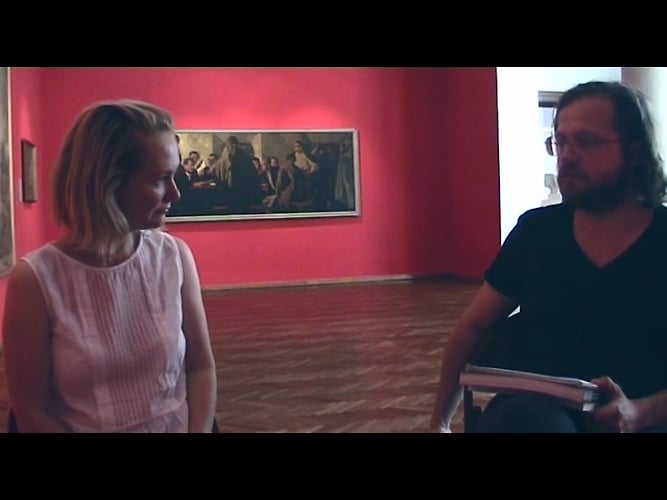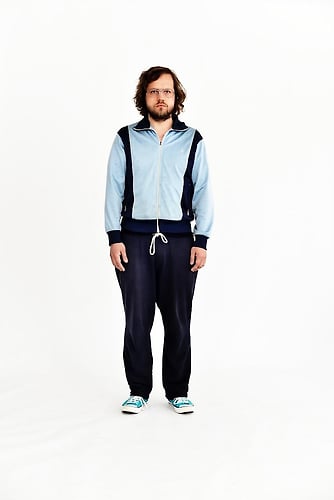Tanel Rander ENG
GuestRoomMaribor2015
Tanel Rander (EST)
“Former Eastern Europe is not an adjective, but a placeholder in the time that is accelerated to such a degree that the politics of memory presents itself as a memory of what was once political. /.../ The former Western Europe makes imaginary what has already been identified as material in the former Eastern Europe, it transforms the materiality of past knowledge, of histories and strategies into imaginary levels. To put it differently, what was important is now made simply obsolete, ridiculous.” (Gržinić, M. (2010): »Decoloniality of time and space«, Reartikulacija, no. 10, 11, 12, p. 15.)
The central premise of the work of the Estonian curator, artist and researcher Tanel Rander originates from a de-colonial theoretical, epistemological and political horizon, 2 where thedifferentiations of (artistic) media, in which he works, or of the context (not necessarily only an artistic context), in which his work is placed, become less relevant. Although this example may at first glance seem, in a way, as a kind of theoretical insertion into the frame of artistic praxes, one of the theses of the de-colonial epistemological-theoretical project is that the tradition of modern western art represents one of the key means of imperialism, colonization, eurocentrism and the process of racialization throughout the modern period.
During the residency Rander continued to explore the subject that he has been working on for a long time − either through the media of art works, lectures and theoretical texts or through curating i.e. the exhibition medium. He focuses on history and the current forming of discourse on Eastern Europe, the socialist political heritage and its potentials in the present, the phenomenon of Yugo-nostalgia, etc. Thus Rander has researched local contexts, in which the aforementioned discourse is constituted; whether in a predominantly artistic context, local activist initiatives or their intersections. Along with a study of local art production, he also interviewed a number of younger and older local actors in field of contemporary art and tied this to a reflection on current economic and political circumstances in Slovenia, Eastern Europe and globally. The public presentation of his findings thus concentrated on the formation of discourse on Eastern art in Slovenia, the phenomenon of aestheticization and culturalization of political heritage and the connection of both to current production circumstances and models of financing next to that he also tried to consider the political potential of nostalgia. The event was, to a degree, planned as a response to the contemporary exhibitions NSK from Kapital to Capital. Neue Slowenische Kunst – an Event of the Final Decade of Yugoslavia in the Museum of Modern Art, Ljubljana, and Our Heroes in Art Gallery Maribor − two central institutions for modern and contemporary art in Slovenia, both of which simultaneously displayed periods from the socialist past.
»The de-colonial option emerges as an option next to the variegated versions of Marxism as well as of Theology of Liberation. It emerged as an analytic and transformative project in the academia (in the US and in South America and the Caribbean) as well as in the public sphere, joining forces with similar and compatible projects advanced by Afro-Andean and Caribbean, Latinas and Latinos, Native Americans and Aboriginal in New Zealand and Australia; immigrants of the ex-Third World in Europe and the US, gay and lesbian struggle, women of color, etc. This is the most immediate context of the de-colonial option as formulated by the collective modernity/coloniality. And in this genealogy of thoughts and activism, liberation is akin to de-colonization.« (Gržinić, M. (2008): De-linking epistemology from capital and pluri-versality – a conversation with Walter Mignolo, part 2, Reartikulacija, no. 5, p. 22.; http://grzinicsmid.si/wpcontent/uploads/2013/02/Rear2008tikulacija5.pdf)
Text: Kaja Kraner
The central premise of the work of the Estonian curator, artist and researcher Tanel Rander originates from a de-colonial theoretical, epistemological and political horizon, 2 where thedifferentiations of (artistic) media, in which he works, or of the context (not necessarily only an artistic context), in which his work is placed, become less relevant. Although this example may at first glance seem, in a way, as a kind of theoretical insertion into the frame of artistic praxes, one of the theses of the de-colonial epistemological-theoretical project is that the tradition of modern western art represents one of the key means of imperialism, colonization, eurocentrism and the process of racialization throughout the modern period.
During the residency Rander continued to explore the subject that he has been working on for a long time − either through the media of art works, lectures and theoretical texts or through curating i.e. the exhibition medium. He focuses on history and the current forming of discourse on Eastern Europe, the socialist political heritage and its potentials in the present, the phenomenon of Yugo-nostalgia, etc. Thus Rander has researched local contexts, in which the aforementioned discourse is constituted; whether in a predominantly artistic context, local activist initiatives or their intersections. Along with a study of local art production, he also interviewed a number of younger and older local actors in field of contemporary art and tied this to a reflection on current economic and political circumstances in Slovenia, Eastern Europe and globally. The public presentation of his findings thus concentrated on the formation of discourse on Eastern art in Slovenia, the phenomenon of aestheticization and culturalization of political heritage and the connection of both to current production circumstances and models of financing next to that he also tried to consider the political potential of nostalgia. The event was, to a degree, planned as a response to the contemporary exhibitions NSK from Kapital to Capital. Neue Slowenische Kunst – an Event of the Final Decade of Yugoslavia in the Museum of Modern Art, Ljubljana, and Our Heroes in Art Gallery Maribor − two central institutions for modern and contemporary art in Slovenia, both of which simultaneously displayed periods from the socialist past.
»The de-colonial option emerges as an option next to the variegated versions of Marxism as well as of Theology of Liberation. It emerged as an analytic and transformative project in the academia (in the US and in South America and the Caribbean) as well as in the public sphere, joining forces with similar and compatible projects advanced by Afro-Andean and Caribbean, Latinas and Latinos, Native Americans and Aboriginal in New Zealand and Australia; immigrants of the ex-Third World in Europe and the US, gay and lesbian struggle, women of color, etc. This is the most immediate context of the de-colonial option as formulated by the collective modernity/coloniality. And in this genealogy of thoughts and activism, liberation is akin to de-colonization.« (Gržinić, M. (2008): De-linking epistemology from capital and pluri-versality – a conversation with Walter Mignolo, part 2, Reartikulacija, no. 5, p. 22.; http://grzinicsmid.si/wpcontent/uploads/2013/02/Rear2008tikulacija5.pdf)
Text: Kaja Kraner
13. 6. 2015
GuestRoomMaribor presents: FROM DECAPITATION TO CAPITAL OR VICE VERSA
Partly as a reaction to the ongoing exhibitions "NSK from Kapital to Capital: Neue Slowenische Kunst - an Event of the Final Decade of Yugoslavia" in Moderna galerija Ljubljana and “Heroes We Love” in Umetnostna galerija Maribor (UGM) an ad hoc debate between Tanel Rander, GuestRoomMaribor's current resident and Kaja Kraner will take place in GT22. The work of IRWIN, Moderna galerija, NSK and others has been based on building bridges with the West and constituting the Slovenian (and ex-Yugoslavian) position within geopolitics, while all the bridges with the social realities of the past have been demolished. “Heroes We Love” in UGM departs from the exclusion of socialist realism and asks if it is possible use its aesthetic potential in order to re-include it to the history of art. The space of inclusion and exclusion can be characterized by the work “Off With Their Heads!” (2013) by Matija Plevnik and Kaja Avberšek, while its genealogy unfolds in the essay “Whose is the Head of the People?” by Mladen Dolar. We are living in the state of permanent amputation. Therefore we invite you to discuss the ways of confrontation to the depoliticising effect of aesthetics, as well as the misused potential of nostalgia.
8. 5. 2015




